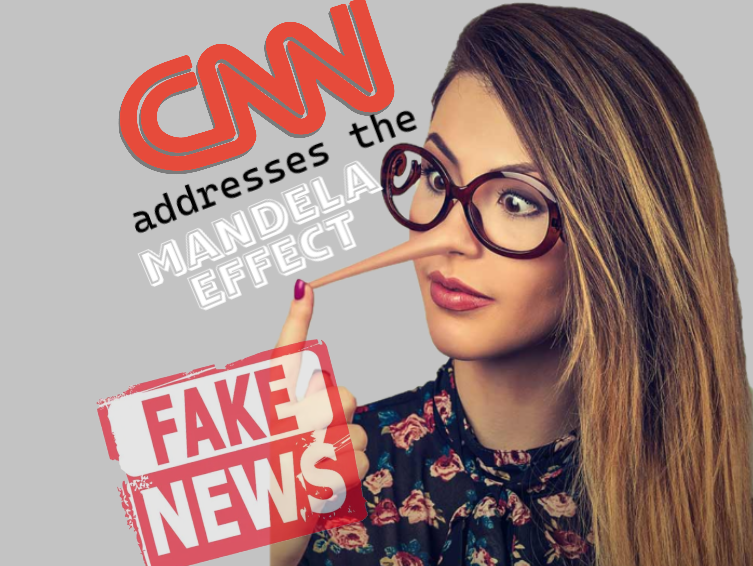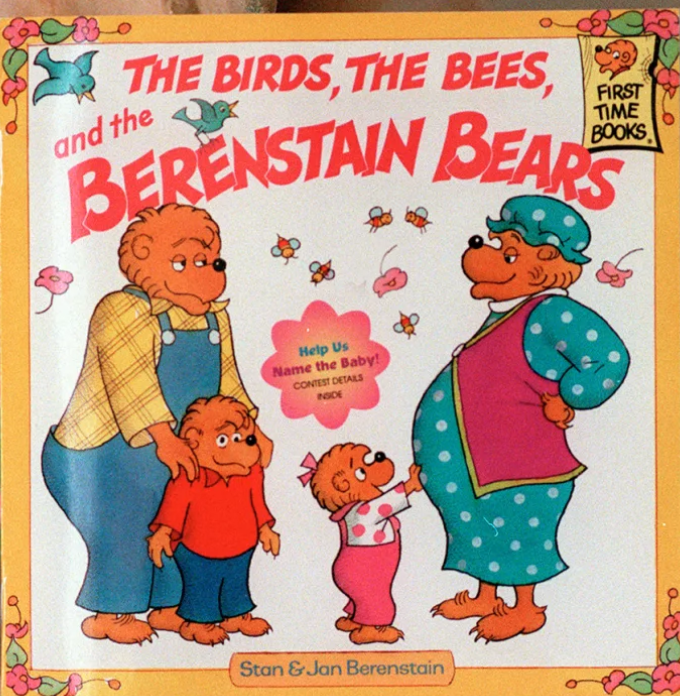CNN Incorrectly Addresses the Mandela Effect Using Scientists to Bolster Their False Narrative
Written by Carol Serpa (Grams Gold) on .
CNN published an article on the Mandela Effect and attempted to brush it under the rug as ‘misremembering.’ But the author cited a number of scientists that did research on it, showing some sort of attempt to link the established body of ‘authority’ to the conclusion. At this point, we all know not to trust ‘authority’.

My comments are italicized in parentheses:
"The ‘Mandela Effect’ describes the false memories many of us share. But why can’t scientists explain it?" (Because they are being told what they can and can't say. And they can't say that the Mandela Effect is a supernatural phenomenon.If you don't know by now-the mainstream media only prints what the elite world controllers want them to print.)
By Jacopo Prisco, CNN
Updated 5:49 PM EDT, Mon September 18, 2023
CNN —
"Does Mr. Monopoly wear a monocle? Is there a black stripe on Pikachu’s tail? And does the fruit in the Fruit of the Loom logo pour out of a cornucopia?
Pikachu (left) has a yellow tail with a bit of brown fur at its base — there is no black stripe. (Correct: no black stripe NOW. You can be an idiot and make that statement.) The Pokémon character is seen with Ash in 1999's "Pokemon: The First Movie."
If you answered yes to any of these questions — sorry, you’re wrong. But you might also be experiencing the so-called Mandela Effect."

"Paranormal researcher Fiona Broome coined the name in 2009 after becoming convinced that then-South African President Nelson Mandela had died in prison in the 1980s. But Mandela did not die in prison; (That's your opinion, which many believe is incorrect.) he was released in 1990, went on to lead South Africa and died in 2013. However, Broome noticed that many others seemed to share the same inaccurate memory, prompting further investigation.
(Let's see. So many shared the same memory, so much so, that they had to create a name for the phenomenon. A phenomenon containing the characteristics that have never occurred before in history, yet you have the nerve to say it's incorrect memories? What a low intelligent, elementary explanation/excuse. )
Since then, more communal false memories have surfaced, such as C-3PO of “Star Wars” fame being entirely golden (he has a silver leg); Jiffy as the name of a well-known peanut butter brand (it’s just Jif); the spelling of a classic children’s book being “The Berenstein Bears” (it’s really “The Berenstain Bears”); and a host of misquotes from movies, among them “Luke, I am your father” from “The Empire Strikes Back” (the actual line is “No, I am your father”)

“If you build it, they will come” from “Field of Dreams” (it’s “If you build it, he will come”) and perhaps the most misremembered of them all, “Mirror, mirror on the wall” from “Snow White and the Seven Dwarfs” (the Wicked Queen actually says, “Magic mirror on the wall”).
But why do so many people misremember these? (Your question emphatically states it's "misremembering". The better question I have is, "Why don't you research the 'residual' evidence? Why do so many, if not all, people- say "Build it and they will come" or "Mirror, mirror on the wall"? Why are you, Mr. Prisco, falling for the narrative of the compromised mainstream industrial medical complex, which is bought and paid for by people intent on our destruction? Or do you write this dribble simply because your handlers pay you to do so? You are essentially being paid to deceive the public. Now that you are on this slippery slope, how far will you go? Will you enable people to their death? You probably already have, pushing the fake narrative that the shots were 'safe and effective' and everyone, including innocent children, should line up for them. Despicable! You are no better than the Nazis who shot people point blank in the head.)
False memories
““The Mandela Effect is a really fascinating memory phenomenon where everyone seems to show incorrect memories for common popular icons,” said neuroscientist Wilma Bainbridge, an assistant professor in the University of Chicago’s department of psychology. (Stop right here. Popular icons? The Bible has changed, many popular music lines have changed, the continents and countries have changed, Michelangelo's art has changed, the human body has changed. Much more than popular icons, genius. Bainbridge may know how the brain functions as a neuroscientist, but apparently has no clue how to do even basic research into a phenomenon that is shared by millions of people and growing every year.)
“It is really growing in popularity on the internet on sites like Reddit and TikTok. And while for many people it’s sort of a fun little game that they might play, I realized that it is actually a very interesting effect of human memory that hadn’t been studied experimentally before.” (No kidding, Sherlock. It has never been studied before, because it's never occurred before. And before you study something, or write such a stupid and baseless article such as this, you have to research all of its facets. How is it that I know exponentionally more about the Mandela Effect than this neuroscientist, having no advanced degree in anthing? Could it be because I'm not getting grant money to show me what I can and cannot look into? Let's continue with this washed up, old narrative that only a mind-wiped sheeple could believe:)
"With coauthor Deepasri Prasad, Bainbridge conducted a rare study published by the journal Psychological Science in late 2022 on the Mandela Effect in which they first confirmed that people have confident, but incorrect, visual memories of famous icons or characters. (Prasad was a lab manager and research assistant at UChicago at the time of the research and is currently a doctoral student of psychological and brain sciences at Dartmouth College in Hanover, New Hampshire.) (These titles mean nothing. People are on to all of the lying scientists that get paid to say what they are told to say. )
In a common example of the Mandela Effect, or collective false memory, (I say 'collective deceptive narrative') the children's book series "The Berenstain Bears," created by Stan and Jan Berenstain in 1962, is often thought of as "The "Berenstein Bears." Yes, all this time the "e" has been an "a." (No, all this time it has NOT been 'a'. People are not stupid animals, and our testimonies have credibility. You have as much investigative skills as a rock, Mr. Prisco.)
"The researchers tried to find simple causes for the phenomenon, such as people not looking directly at the detail in question when observing the character or images across the internet displaying the errors, but they found no match for these hypotheses. Bainbridge and Prasad also had the participants in the experiment draw the icons from memory to see whether they would spontaneously create these errors, and they found that they often did.
“A big takeaway is that while the Mandela Effect shows up across different types of experiments, there’s no one clear explanation for it,” Bainbridge said, “so future research is needed to see what’s causing this.”
It’s important to remember how prone we can be to inaccuracy, noted Neil Dagnall, a cognitive and parapsychological researcher at Manchester Metropolitan University in the United Kingdom. “Very often when we’re processing information, we see things as we think they are, rather than they actually are. Attention is a very interesting phenomenon,” said Dagnall, who is a reader in applied cognitive psychology.
“With the Mandela Effect, people are often remembering things the way they think they should be rather than they actually are — because we just process things very quickly in everyday life.”
Dagnall brought up the example of the Deese, Roediger and McDermott task, a false memory test in which people receive lists of words to recall: “For example, if we gave people sewing-related items — like pin, cotton, thread — when they are asked to recall them, they also recall words that weren’t in the list, but are associated with sewing, like needle.” In the same way, people could be adding thematically similar details to their recollection of an image, he said. (Give me a break. That's why we added a monocle to the Monopoly Man-because we see so many monocles when we go to the bank, that we just associate monocles with money. And don't say we confused the Peanut Man with Mr. Moneybags, because many people in Europ never have seen Mr. Peanut and still think Monopoly Man has a monocle. This phenomenon has nothing to do with the stated study.)
Ken Drinkwater, a fellow researcher at Manchester Metropolitan, added that the effect might be connected to a condition called false memory syndrome. “In their individual identity and in the way they see the world, people are influenced by factually incorrect recollection. They could strongly believe in something, or strongly believe that they’ve had this experience or this memory, but in actual fact, it’s fantasy,” said Drinkwater, a senior lecturer at the university.
“Several years ago we got to look at whether people could tell between genuine and imagined memories,” Dagnall said. “If you ask people questions about an air disaster, for example, when they recall the events, they wouldn’t just recall what they saw on the news. They would also recall additional information, because they aren’t able to discriminate between what they’d seen — their actual memory — and what they’d imagined. If you think about a plane crash, you can imagine many associated things because you’ve seen them in films, on TV or in the news.”
Many people think Mr. Monopoly (right) wears a monocle. However, they may be confusing his appearance with that of Mr. Peanut, who shares a similar sartorial style.
Some common examples of the Mandela Effect have perhaps logical explanations, such as Mr. Monopoly wearing a monocle because it complements his old-fashioned sartorial style — similar to Mr. Peanut, who has one — or Pikachu having a black tip on his tail because his ears also have black tips. But these generalizations may not apply to other errors.
Parallel worlds?
One peculiar collective memory that demonstrates how powerful false recall can be is of a supposed 1990s movie about a genie called “Shazaam,” starring actor David Adkins, better known as Sinbad. There is no such movie, to the bafflement of countless people on the internet who could have sworn to the contrary.
No, Sinbad never starred in a 1990s movies called "Shazaam." He is shown at the 2018 Fox Television Network Upfront in New York City.
What does exist, however, is the 1996 movie “Kazaam,” starring Shaquille O’Neal as the title character.
“Advocates of the Mandela Effect think it’s a genuine effect. Many believe this is based on the many worlds or multiverse theory, and that things are different in parallel realities,” Dagnall said, referring to the theory that suggests there may be other universes — potentially an infinite number of them — beyond our own. “I also came across the idea of time travel, which would be causing small changes in the fabric of time.”
Another popular theory is that the Large Hadron Collider — a particle accelerator at the European Organization for Nuclear Research, known as CERN, in Switzerland — has opened a portal to a different dimension when it was activated in 2008. Clara Nellist, a CERN particle physicist, responded to such concerns on TikTok — specifically about Oreo “Double Stuf” cookies bearing that name rather than “Double Stuffed” — saying that “there are much higher energy particle collisions happening in our atmosphere all the time. … I can promise you we are not going around changing the labels on your food.” (Right! You said you 'promise' so we believe you! Just what have you found after spending billions of dollars every year? Why do you recruit employees with the stated objective of bringing in 'demonic entities from parallel dimensions', a direct quote from Mr. Geordie Rose? Why don't you write an article on that, Mr. Prisco?)
Clara Nellist, a CERN particle physicist, took to TikTok to dispel conspiracy theories circulating on social media that the Large Hadron Collider in Geneva was used to manipulate the brand name of Oreo Double Stuf Chocolate Sandwich Cookies.
The lack of evidence (there is plenty of evidence: It's called 'residual". How is it you don't know about that, and do not address that? ) to support these theories hasn’t stopped people from getting creative with them. One TikTok account, for example, shows popular Mandela Effect examples through the screen of an early camera phone, which displays the “alternate” version because it is supposedly a technological relic from a parallel universe. (This video was faked. I know this through a thing called 'research' into types of video manipulation techniques.)
“During times of uncertainty, like the pandemic, disinformation, misinformation and conspiracy theories become more prevalent,” Drinkwater said. “People want to look at something that gives them more meaning. So it could be that belief in the Mandela Effect might be heightened because of this process.” (Remind me never to drink this guy's water, Mr. Drinkwater.)
The University of Chicago’s Bainbridge, however, said she has bad news for alternate reality hopefuls. “Sorry to disappoint people who believe in the parallel universe, (so, wait- are you saying the Mandela Effect is real, by admitting it may be caused by parallel universes? I thought it was 'misremembering?') but in our drawing study, we asked people if they had heard of Pikachu or Mr. Monopoly before, and if they said no, we would show them a picture. Then, after a short delay, we asked them to draw them from memory,” she said.
“Even those who had never heard of them (So you asked someone who never heard of Mr. Monopoly to draw him - and you call this research? Sign me up for that gig.) still made some of these errors, like the tail and the monocle. These people had this false memory right after learning about the characters! Which shows that this effect can happen even without going across parallel dimensions.” (By the way, if you want my help in writing a real article on the Mandela Effect, I can do that. Because this has to be one of the lamest ones I've ever read.)
(Let me tell you of a few real Mandela Effects. I got up one day and saw that the title on my garbage can changed from "Simply Human" to "Simple Human". I went out to the car one day and the knob in the center of the panel moved from the center to the left, and no longer displays 'gas mileage usage'. I know this for a fact because I was always irritated that the knob was in the center, as when I pushed it to read it, my hand blocked the numbers. A popular online podcaster on the Mandela Effect noticed last year that his city sign changed from "Centerville" to "Centralville". He called and taped businesses who still say it's "Centerville" including real estate listing who also printed "Centerville" online. This is what is really happening out here from real people who really experience it, not long titled paid scientists who have no real clue, and are stuck in their indoctrinated paradigms.)


